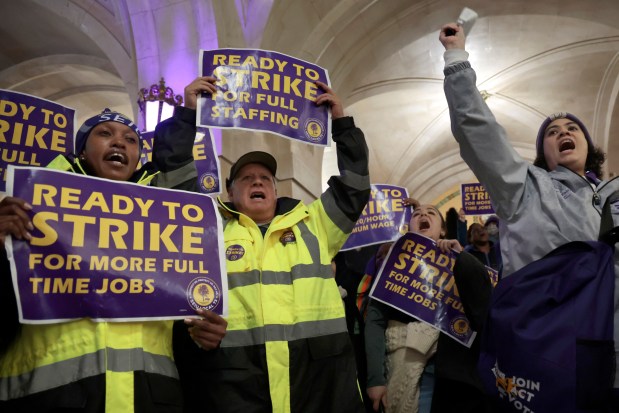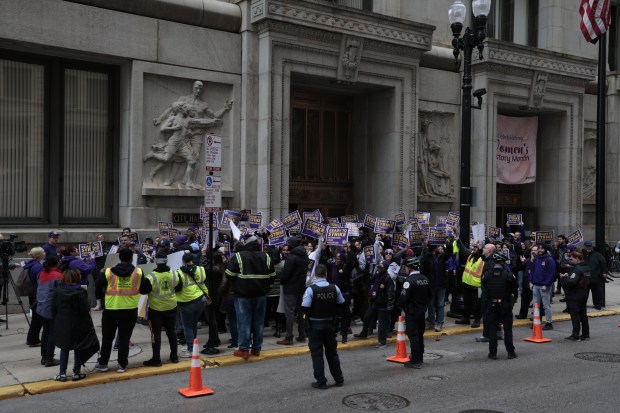At least 50 Chicago Park District union workers marched into City Hall on Tuesday to demand Mayor Brandon Johnson intervene in contract negotiations that have reached the brink of a strike.
Service Employees International Union Local 73 — which represents more than 2,200 park workers, including supervisors, landscapers, instructors and lifeguards — voted earlier this month to authorize the strike amid nine months of contract negotiations with the Park District.
Though Johnson is responsible for oversight of the Park District, it is governed by a seven-member board appointed by the mayor and managed by a CEO. The management team is negotiating the contract and its current chief executive, Rosa Escareño, was appointed by commissioners under former Mayor Lori Lightfoot following a major leadership shake-up from a sexual misconduct scandal involving lifeguards.
The demonstration, while brief, entailed one of the largest local union occupations of City Hall’s lobby since the more labor-friendly Johnson administration took office last May. The political committees for SEIU affiliates have contributed about $4.6 million to Johnson since he kicked off his campaign for mayor in late 2022, about $515,200 of which came from Local 73’s fund.
Before delivering the petition to the mayor’s office on the fifth floor, Local 73 President Dian Palmer stressed that “I’m not disappointed” the mayor hasn’t waded in during the past nine months, but said she thinks the time is now to get the contract settled.
“The parks are having some concerns, and so we’ve come to City Hall to get the mayor involved,” Palmer said. “I want to say that I looked up the parks for Chicago before I came down here, and there was a Latin word that they used — ‘Urbs in horto,’ which means ‘A city in a garden.’ And right now, we don’t feel like this is much of a garden.”
The mayor’s office in a statement Tuesday declined to comment on “specifics of ongoing negotiations” but nodded to Johnson’s labor roots with the Chicago Teachers Union.
“As a former labor union organizer and union member, Mayor Johnson respects the right of all workers to collectively bargain to improve their workplace conditions,” Johnson spokesman Cassio Mendoza wrote. “Mayor Johnson hopes that an agreement can be reached soon that is fair to the Park District workers who make our parks run while ensuring that the Park District remains on strong fiscal footing so that they can continue to offer the programs and services that are a vital part of the fabric of our city.”
Chicago Park District spokeswoman Irene Tostado stressed in a statement that “good faith” negotiations are ongoing with SEIU.
“The Chicago Park District values its workforce and the work they perform daily to support our parks and the children and families that rely on our services,” Tostado wrote. “We have taken great strides over the last several years to create a supportive workplace culture for our team and park users. We look forward to continuing good faith negotiations and arriving at an agreement in the very near future.”
Palmer did not directly answer whether she had already privately asked Johnson to help out with the contract, which expired last year. Now that an authorization vote has been taken, the union could decide to strike at any time. It must first give a five-day notice before members stop showing up to work. Local 73 parks workers were in a similar situation in 2019, but a last-minute deal averted a strike.
Union officials said sticking points include a $20 hourly minimum starting pay for all workers, including the Park District’s lowest-paid recreation leaders and lifeguards, who now make just over $16 an hour; wage increases to reward longevity; and beefing up hiring and health insurance. They complained current wages are so low that there are hundreds of vacant positions, which in turn leads to major cuts in programming at park facilities.
The Park District, however, noted in its statement that improvements were part of the district’s 2022 benefits package, including eight-week parental leave as well as a recruitment campaign last summer that netted more than 2,200 seasonal workers. Other city employees such as Chicago Public Schools staff members, however, get 12 weeks of parental time off.
The nationwide lifeguard shortage following the onset of the COVID-19 pandemic — and a local reckoning over widespread sexual misconduct allegations at Chicago’s public pools and beaches — led to Park District pools reopening later than anticipated, with some remaining closed until 2023.

The Park District is not the only city agency facing heat from Local 73, which represents more than 35,000 workers across Illinois and northwest Indiana. CPS management also has been negotiating with that SEIU chapter since early summer. Local 73 Executive Vice President Stacia Scott said at Tuesday’s news conference that the chapter’s 11,000 classroom assistants, janitors and other CPS employees “currently are in the same position that the parks are in terms of stalling.”
Scott, a lead negotiator in the CPS contract talks, said economic issues, such as raising the wage floor, are also the main sticking points for the school employees.
“What they have in common with our Park District members is that they’re required to live in the city of Chicago, and so what we’re asking for is a fair living wage that keeps up with inflation and rising rent costs,” Scott said.
Before her union handed the enveloped petition to one of Johnson’s aides Tuesday, Palmer stressed that Park District employees are well-educated but make hardly more than minimum wage.
“They could work anywhere, but they chose to work in the parks,” Palmer said. “So I say the city has to do right by these workers. And if they don’t, then we got to do what we got to do.”
Jeffrey Howard, the chapter’s other executive vice president, shouted behind her: “Shut it down!”



